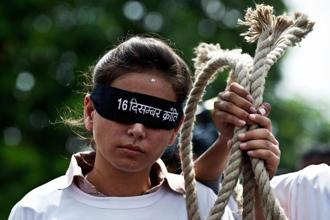 New Delhi, Sept 13: A judge will announce today whether four men should hang for fatally raping a young woman on a bus last December, in one of the biggest tests in years of India's paradoxical attitude towards the death penalty.
New Delhi, Sept 13: A judge will announce today whether four men should hang for fatally raping a young woman on a bus last December, in one of the biggest tests in years of India's paradoxical attitude towards the death penalty.
Indian judges hand down on average 130 death sentences every year, but India has executed just three people in the past 17 years. Despite its apparent reluctance to carry out the sentences, last year India voted against a U.N. draft resolution calling for a global moratorium on executions.
In November, India ended what many human rights groups had interpreted as an undeclared moratorium on capital punishment when it executed a militant convicted for the 2008 militant attack on Mumbai. Three months later, it hanged a man from the Kashmir region for a 2001 militant attack on parliament.
"In the past year, India has made a full-scale retreat from its previous principled rejection of the death penalty," said Meenakshi Ganguly, South Asia director of Human Rights Watch.
She called for the complete abolition of the death penalty.
Prosecutors want the "harshest punishment" to be given to bus cleaner Akshay Kumar Singh, gym instructor Vinay Sharma, fruit-seller Pawan Gupta, and unemployed Mukesh Singh for the murder of the woman to send a signal to society that such attacks would not be tolerated.
Sex crimes are commonplace in India, and social commentators say patriarchal attitudes towards women have not been diluted by rapid economic growth.
The victim's parents have said their daughter's dying wish was for her attackers to be "burned alive".
The four men were found guilty this week of luring the 23-year-old trainee physiotherapist onto a bus on Dec. 16, raping and torturing her with a metal bar and then throwing her naked and bleeding onto the road. She died two weeks later.
Defence counsel A.P. Singh urged Judge Yogesh Khanna to ignore the clamour for the death penalty, which he said was a "primitive and cold-blooded and simplistic" response.
"RAREST OF THE RARE"
If the men are sentenced to death, a potentially years-long appeals process lies ahead. The case will go the High Court and then the Supreme Court. If the courts confirm the sentences, the final decision will lie with the president, who has the power to grant clemency.
The death penalty should be imposed only in the "rarest of rare" cases, according to a Supreme Court ruling in the early 1980s. But opponents, including former High Court judges, say the reality is quite different.
Indian courts sentenced 1,455 prisoners to death between 2001 and 2011, according to the National Crime Records Bureau. During the same period, sentences for 4,321 prisoners were commuted to life imprisonment.
There are 477 people on death row. Many have been there for years. Human rights groups have been alarmed, however, by the vigour with which President Pranab Mukherjee, who was sworn into office in July 2012, has acted in clearing the backlog of clemency pleas. He has rejected 11, confirming the death penalty for 17 people.
Retired Delhi High Court judge R.S. Sodhi attributes the country's low execution rate to former Indian presidents being "too soft", wary of any backlash from what he described as a divided public.
Sodhi, who said he sentenced five people to death during his time on the bench, now opposes the death penalty.
"A life sentence is the biggest sentence you can give. Imagine rotting for the rest of your life in jail," he said.
It is a view echoed by some women's rights groups and legal experts who oppose executing the physiotherapist's attackers. Others invoke the Gandhian principle that "an eye for an eye makes the whole world blind".
But top politicians, including interior minister Sushilkumar Shinde, have said the death penalty is assured in the case. Such comments have been seen by some as adding to pressure on the court to make a populist ruling to satisfy the public outrage over the attack.
"Public opinion and particularly media channels are adding fuel to the fire. It is putting the judiciary on the back foot," said Colin Gonsalves, a lawyer who has appeared in the Supreme Court and is founder director of the Human Rights Law Network.





Comments
Add new comment